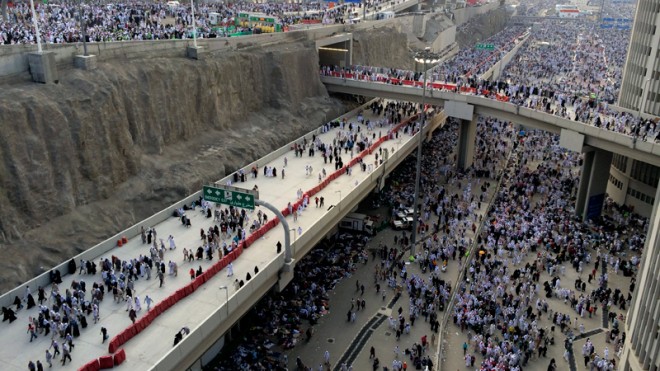
In this Sunday, Oct. 5, 2014 photo, thousands of Muslim pilgrims make their way to throw stones at a pillar, symbolizing the stoning of Satan during the annual pilgrimage, known as the hajj, outside of Mecca, Saudi Arabia. The roughly five-day hajj is meant to cleanse the faithful of sin and required of all able-bodied Muslims to perform once in their lives. Though pilgrims will repeat the stoning ritual for two days, they can now be referred to as “hajjis,” a term of honor for completing the pilgrimage. (AP Photo/Khalid Mohammed)
MINA, Saudi Arabia — Saudi Arabia’s acting health minister said Monday that this year’s hajj has been free of Ebola and other contagious diseases because of measures taken by the kingdom to protect more than 2 million pilgrims who took part in the annual Islamic pilgrimage.
The hajj, which lasts around five days, ends Monday. Pilgrims began leaving the desert tent city of Mina, where they were taking part in the ritual of the stoning of the devil, one of the last rites of the hajj. Many headed back to Mecca, ending the hajj as they started it by circling the cube-shaped Kaaba seven times.
There were concerns regarding Saudi Arabia’s readiness to ensure a healthy hajj for pilgrims after the kingdom became the epicenter for the potentially fatal Middle East Respiratory Syndrome, or MERS. Several health workers and doctors died of that coronavirus in Saudi Arabia earlier this year, raising alarm about the safety of hospitals.
Acting Health Minister Adel Faqih told reporters that the kingdom deployed thousands of health workers during the hajj and performed data screening on pilgrims upon arrival to the kingdom as a precaution.
“I am pleased to announce that the hajj … was free of epidemic diseases. May God accept the pilgrimage of our guests and ensure that they enjoy good health and wellness,” Faqih said.
Faqih told The Associated Press on the sidelines of the press conference that the kingdom’s ban on issuing visas to people from Sierra Leone, Liberia and Guinea would remain in place for the foreseeable future. The measure affects some 7,400 would-be pilgrims from the west African countries, which have been the hardest hit by the virus.
“That will continue until further notice until we are comfortable that it is not anymore an epidemic in these countries,” Faqih said.
The World Health Organization estimates that Ebola has killed more than 3,400 people.